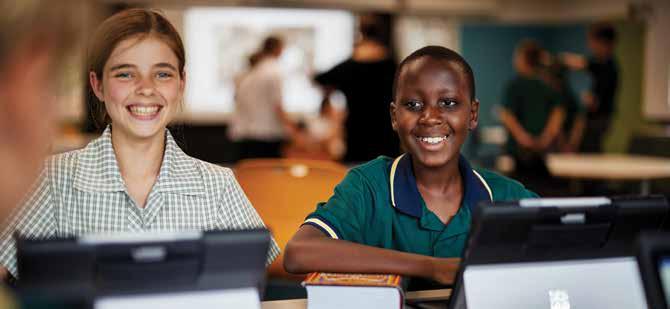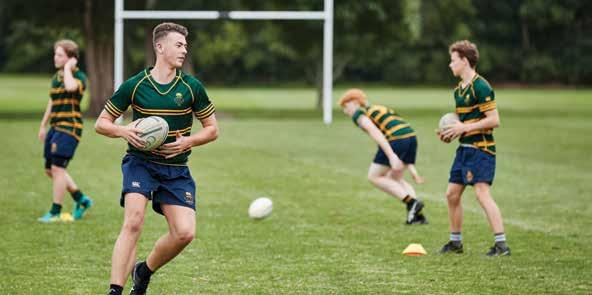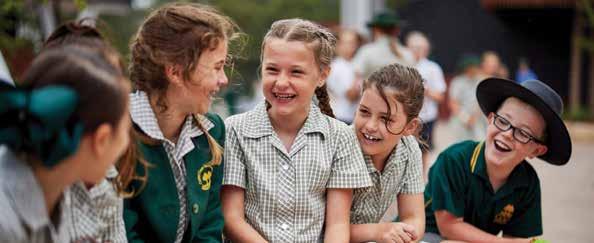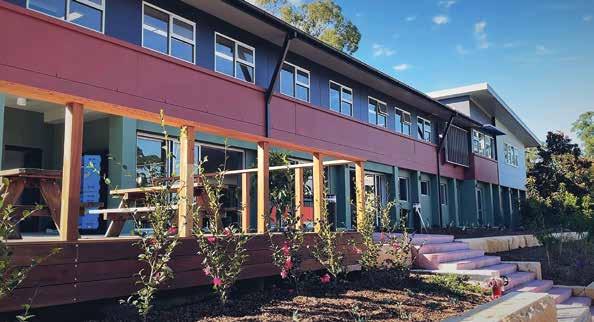














Our ongoing investment and sustained focus on the key goals of our strategic plan continues to drive innovation and success across all dimensions of school life.
In looking forward, leaders from across the CCGS team collaborated with the Board to evaluate our strengths, identify areas for development and set our priorities.
Robust governance, leadership, and management have driven significant progress in all our focus areas. Wellbeing continues to be a key focus. Next generation teaching and learning has gained incredible momentum.
Striving for Excellence 2021 – 25 honours the progress we have made and sees our key strategies and objectives adapt to new opportunities and challenges.
Through partnering closely with leaders in learning design, we will continue to embed contemporary educational practices into the work of staff and the lived experiences of students.
We will challenge students to be their best, through learning design and curriculum which meets students at their point of challenge and considers the diversity of our learning community.
As we look to the future, our aspiration for our young people will be informed by research, evidence and investment in the people and environments that enable us to strive for excellence.



Central Coast Grammar School acknowledges the Darkinjung people, the Traditional Owners of the land on which the School is located. We acknowledge the continued deep spiritual attachment and relationship of Aboriginal and Torres Strait Islander peoples to this country.
STEPHEN BRAHAMS SCHOOL BOARD CHAIR PHIL O’REGAN HEADMASTER





Striving for excellence in all endeavours in a happy, caring and supportive environment.
• Kindness
• Inclusivity
• Gratitude
• Respect
• Integrity
• Resilience
• Responsibility
Our graduates will be mature and articulate global citizens. They will have maximised their potential and have been exposed to a wide variety of academic and cocurricular opportunities. They will have developed into confident, caring and well balanced young adults.
Our graduates will be able to thrive in a rapidly changing world through their collaborative skills, technological competence, enterprising spirit and capacity for innovation.
TEACHER QUALITY

DIGITAL CITIZENSHIP
ACADEMIC ACHIEVEMENT
NEXT GENERATION LEARNERS
STRIVING FOR EXCELLENCE
HOLISTIC EDUCATION
WELLBEING
GOVERNANCE & MANAGEMENT
COMMUNITY

COLLABORATION
CRITICAL AND CREATIVE THINKING
CITIZENSHIP
COMMUNICATION
CHARACTER
ADAPTABILITY
NEXT GENERATION LEARNERS
DIGITAL LITERACY
STRIVING FOR EXCELLENCE
ACTIVE LEARNING
GOAL: Create a contemporary learning community which empowers students and staff with the learning characteristics necessary to engage, contribute and innovate.
KEY STRATEGIES
• Develop learning environments, programs and teaching practices that maximise Next Generation Learning (NGL)
• Ensure NGL characteristics inform teaching and cocurricular programs

• Develop a community of contemporary learners where students, teachers and parents/carers are engaged, collaborative participants

KEY OBJECTIVES
• NGL characteristics are articulated and embedded in an age-appropriate and relevant way for different Stages of schooling
• Common logos, schemas and charts are displayed school-wide to create a coherent language and understanding about NGL characteristics
• A professional learning program continues to enhance teachers’ understanding and ability to develop NGL characteristics
• NGL characteristics are modelled at all levels
• The effectiveness of NGL environments is optimised
WE WILL MEASURE OUR SUCCESS BY
• Analysis of school-wide curriculum documentation, teaching programs and professional practice indicates NGL characteristics are being implemented
• Evaluating ongoing NGL professional learning annually
• Evaluating the impact of NGL practice on student outcomes and engagement
• Evaluating the effectiveness of the development of NGL capabilities
• Evaluating the level of teacher and student engagement with new learning environments

MAXIMISE INDIVIDUAL POTENTIAL
QUALITY LEARNING
EVIDENCE BASED IMPROVEMENT PLANS
ACADEMIC ACHIEVEMENT
STRIVING FOR EXCELLENCE
TEACHING, LEARNING & ASSESSMENT FRAMEWORKS
STRIVING FOR EXCELLENCE
• Advance a culture in which students, parents/carers, and teachers have high expectations that every student will achieve their full potential
• Ensure quality learning in every environment
• Strengthen evidence-based strategies, including academic data, to analyse past performance and plan for improved performance

• Sustain a contemporary, whole-school, forwardthinking framework for teaching, learning and assessment
• Diversify and expand existing programs to cater for all students

• Excellence in academic performance continues to be recognised through systematic acknowledgement
• Differentiated approaches to teaching and learning are explicit and implemented in all teaching programs
• A clearly articulated approach to support high potential learners and accelerated students is implemented
• A clearly articulated pathway for non-ATAR students and part-time HSC students is developed and implemented
• Communication relating to the academic achievement of individual students is strengthened between sub schools
• The policy framework for high potential learners and students with additional needs is revised and implemented
• A data driven, systematic approach to academic improvement plans is implemented
• A data analytics package is implemented to assess and track student performance
• Student assessment methodologies are developed and continually evolved
• Analysing evidence of differentiated teaching from teacher appraisals, teaching programs, classroom practice and assessments
• Evaluating the implementation of high potential learners, accelerated students and additional needs programs
• Evaluating the breadth and effectiveness of alternative pathways
• Evaluating practices for supporting students with additional needs
• Analysing data to inform the effectiveness of academic improvement plans, including performance in external examinations and tests
• Evaluating the K to 12 framework for teaching, learning and assessment

HOUSE SYSTEM
RESPONSIBILITY
HOLISTIC EDUCATION
GLOBAL CITIZENSHIP
ACADEMIC ENGAGEMENT
CULTURAL AWARENESS
STRIVING FOR EXCELLENCE
COCURRICULAR
GOAL: Every student is encouraged to access a holistic education.
• Encourage students and parents/carers to take responsibility for participation in all aspects of School life
• Provide a wide variety of cocurricular options
• Nurture connected relationships within school, local, national and international contexts
• Strive to continually improve student engagement and academic performance

• Strengthen student wellbeing, connections and leadership through the House system
• Encourage cultural awareness and celebrate cultural diversity
• Strengthen student community service and leadership

• Graduates are equipped with the skills, attributes, values and qualities to make a worthwhile contribution to the lives of others
• Students take responsibility for their holistic learning experience, their behaviour, the School environment and their relationships within the broader community
• A rich, comprehensive and diverse range of educational, cultural and cocurricular programs is provided to promote active engagement in School life and a healthy lifestyle
• A program of cocurricular options is mapped and published at the start of each semester
• Both academic and non-academic achievement is recognised and rewarded
• Active participation in House activities enhances collaboration, leadership and social connectedness
• A variety of domestic and international experiences foster mature and articulate global citizenship
WE WILL MEASURE OUR SUCCESS BY
• Evaluating individual student attainment and progress towards achieving their academic and personal potential
• Evaluating programs and practices that develop leadership skills
• Evaluating the scope and quality of the cocurricular program
• Analysing student participation rates in educational, cultural and cocurricular programs
• Evaluating programs which promote international awareness and a global perspective
• Evaluating opportunities for students to exercise community leadership

RECRUITMENT
COLLABORATION LEADERSHIP FOR LEARNING
INNOVATIVE TEACHING
TEACHER QUALITY
STRIVING
PROFESSIONAL LEARNING
TEACHER
APPRAISAL
GOAL: Continually develop expert teachers who engage professionally and empower students to maximise their potential.
KEY STRATEGIES
• Develop a framework to exemplify collaboration, academic and wellbeing outcomes and maximise the impact of learning environments
• Maintain supportive teacher appraisal for the purposes of recognition and improvement

• Provide professional learning opportunities for all teachers
• Foster a quality professional environment
• Promote innovative teaching practice
• Recruit and retain quality teachers

KEY OBJECTIVES
• Teacher capability to maximise the impact of contemporary learning environments is continually developed
• Teaching teams plan, deliver and evaluate explicit strategies relating to teaching and learning practice
• Senior and middle management provide high level leadership for learning
• Supervision and appraisal procedures continue to evolve, reflecting strategic priorities
• An annual K to 12 Professional Learning Plan is developed and implemented
• Teachers engage with professional learning that is focused on strategic goals
WE WILL MEASURE OUR SUCCESS BY
• Evaluating teacher practice in enhanced learning environments
• Evaluating effectiveness of leadership for learning
• Evaluating quality and quantity of professional learning through direct teacher feedback
• Evaluating, publicising and celebrating innovative practice and new initiatives adopted by staff
• Evaluating the impact of the Professional Learning Plan on teaching practice and student outcomes

INCLUSION
LEADERSHIP SUPPORT
STUDENT VOICE
WELLBEING
COMMUNITY
SELF-AWARENESS
STRIVING FOR EXCELLENCE
CCGS
GOAL: Individuals realise their own abilities, and are empowered and supported to meet challenges and make positive contributions to the community.
• Provide connected, supportive, caring and respectful learning environments
• Ensure a welcoming culture that values diversity and cultivates connected relationships
• Enable students to use their social and emotional skills to be respectful, resilient and safe

• Collaborate across the School community to support student and staff wellbeing
• Cultivate a shared understanding of wellbeing to support positive relationships and social outcomes
• Minimise negative student behaviours

• The School’s wellbeing framework principles, programs and priorities are communicated and promoted
• The diversity of the School community is celebrated, and proactive strategies to build a cohesive and supportive climate are implemented
• Social and emotional skills are explicitly taught across the curriculum, using evidence-informed practices
• Welcoming and inclusive strategies are developed to sustain culturally respectful partnerships with families and communities
• House Family sessions include activities mapped to the wellbeing framework
• Specific actions are implemented to focus on and promote staff wellbeing
• Early identification and intervention are available for staff and students requiring support
• Communication relating to the wellbeing of individual students is strengthened between sub schools
• Respond to impacts on the wellbeing of our community from significant external or global events
WE WILL MEASURE OUR SUCCESS BY
• Implementing a data analytics package to
> track and enhance student wellbeing in areas such as absentee rates, positive recognition of students and relationship dynamics between students
> track student engagement and resulting adoption of the wellbeing framework principles
> track trends in student social and emotional skills
• Evaluating the programs and practices that develop respectful partnerships with families and communities
• Evaluating School community wellbeing through periodic surveys of students, staff and parents/carers

DIGITAL LITERACY
CONNECTED COMMUNITIES
CREATIVITY
DIGITAL CITIZENSHIP
REAL WORLD PRACTICE
STRIVING FOR EXCELLENCE
COLLABORATION
INNOVATION
GOAL: Develop a high level of digital citizenship and a culture of innovation, encompassing staff, students and the School community.
KEY STRATEGIES
• Ensure technology is used effectively and responsibly to improve learning and reflect real world practice

• Strengthen digital capabilities across the School community

KEY OBJECTIVES
• Digital literacies and emerging technologies are incorporated in teaching programs
• Digital technology is integrated across teaching, communication and administrative functions
WE WILL MEASURE OUR SUCCESS BY
• Evaluating the K to 12 digital literacy scope and sequence to ensure currency
• Evaluating the adoption of emerging technologies within programs and teaching practices
• Evaluating the provision of digital technology education across the School community
BELONGING

ENGAGEMENT
COMMUNITY
LEADERSHIP AND
STRIVING
PARTNERSHIPS
SOCIAL
GOAL: Positive engagement throughout the School community.
KEY STRATEGIES
• Engage with the Central Coast region and contribute through community service programs
• Promote the School’s ethos and identity

• Continue positive partnerships with school, community, business and professional organisations

KEY OBJECTIVES
• Social and professional networking opportunities are offered to current and past parents and students
• Alumni are encouraged to engage with the School
• Partnerships with our global network of exchange schools are enhanced
• Reciprocal arrangements are sought which benefit the School and our partners
• Community communication and engagement are continually improved
• Community partnerships are celebrated and promoted
• Staff contribute to the profession and peak bodies through active engagement
WE WILL MEASURE OUR SUCCESS BY
• Analysing the engagement of alumni with the School
• Evaluating partnerships with community, business and professional organisations
• Evaluating the effectiveness of communication channels

CURRICULUM & COCURRICULUM
ENVIRONMENT
STRATEGIC DIRECTION
GOVERNANCE AND MANAGEMENT
EFFICIENT PROCESSES
STRIVING FOR EXCELLENCE
REPUTATION
FINANCIAL RESPONSIBILITY
GOAL: Ensure the long-term sustainability of our institution through effective and efficient governance, strategic planning and management.
• Shape and plan strategic direction
• Ensure ongoing financial capacity and viability
• Promote the School as an institution of excellence and achievement
• Continually identify inefficiencies to improve productivity and business management processes
• Create, maintain and improve learning environments that support and drive quality practice and engagement
• Ensure effective risk management
• Ensure effective human resource management
• Meet all statutory compliance requirements
• Maximise energy efficiency and environmental sustainability
• Continually improve internal communications

• The impact of changes in non-government school funding is mitigated
• Sound marketing promotes the School’s reputation and achievements
• Board governance and executive management processes are externally reviewed periodically
• Risk management identification and mitigation processes are actively managed
• Compliance with all regulatory requirements is achieved through ongoing review
• A facilities master plan includes the forward planning of facilities and a regular maintenance program
• The School’s environmental credentials are continually enhanced

• Evaluating the effectiveness of technology information systems
• Analysing enrolment processes and targets
• Evaluating risk management processes
• Evaluating financial results annually
